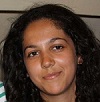 Social Entrepreneur/Organization/
Social Entrepreneur/Organization/
Initiative/Crisis Prevention
“I envision myself as an active person who can work with others to make a difference,” Najwa Andaloussi says. She has good reason for thinking this, and her country needs young people like Najwa who can work together to prevent the many looming crises.
The controversy over the Western Sahara continues to define the political climate in the kingdom of Morocco, as it has done for the past thirty years, pitting Morocco directly against the separatist Polisario front and indirectly against Algeria who backs it. The peace-keeping negotiations have faltered, leaving the possibility of armed conflict an ever-present concern.
In addition to its climate problems like desertification, drought, and rising coastal sea levels, Najwa says, “Morocco is a nation defined by migration and security challenges.” Yearly, thousands of people from sub-Saharan Africa travel through Morocco seeking immigration to Europe. The high unemployment rates add to social instability, creating a fertile ground for insurgency and extremist ideologies such as Al-Qaeda’s. “Morocco’s limited resources and insufficiently secured borders underline the urgent need for a more effective security nexus,” she says, in order to prevent the potential spread of instability throughout the region, including Europe.
Najwa’s interest in politics, international affairs, and global cultures motivates her to pursue international economics after getting her B.A. She hopes to further her graduate studies in the U.S and feels the HSI program is an advantage to that end. It has helped her understand how the world interconnects politically and economically and has allowed her to spread awareness about Morocco’s issues.
Najwa has already begun to make a difference in her world. Last year, as strategic planner, she coordinated a trip for 36 blind people to Ifrane, sometimes called the Switzerland of Morocco, for an NGO called the Alawite Organization for the Protection of the Blind. Budget, individuals’ destination preferences, transportation, reservations, and personnel decisions all fell to her. The budget had only allowed for four assistants to watch and assist the blind tourists. This seemed inadequate to Najwa, but she managed to convince a few of her friends to volunteer, allocating an assistant to every four to five blind individuals. This decision helped keep the stress down as everything functioned more efficiently and participants’ needs were better addressed.
“I am a very focused person and I like to think of myself as a problem solver,” Najwa says, “two traits that are crucial to have as a leader to keep teams, goals, and strategies on track.” She values her capacity to clearly communicate and instill trust through honesty—“both about things going well and when things do not run smoothly.” She also earns trust when members understand she’s there to serve the team and be fair. “A good leader knows also when to reward and how to inspire and motivate others in order to keep the atmosphere positive,” she says.
Najwa was one of four HSI students awarded funds for the blind people she works with who urgently need equipment and educational programs. She proposed a micro-finance service that would help the blind become more independent and self-reliant through crafts, skills, and trades such as weaving, pottery-making, and sewing. Najwa believes such handicrafts are in huge demand in her tourist-oriented community. This service would become sustainable after initial financing because a percentage from product sales could be used towards funding future classes. She also proposes that a small percentage be used for tools, equipment, Braille materials, sound programs, and music classes. Such opportunities would save many from the unfortunate life of begging on the streets and even enable the blind workers to overcome the barrier of social exclusion and become part of the community.
